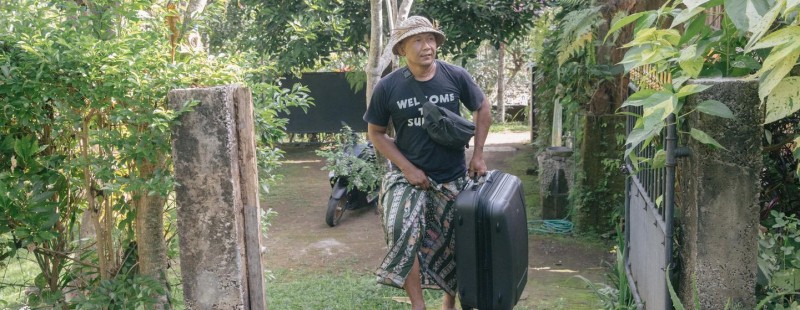Dekha Dewandana carries his guest suitcase at Esa di Kubu Homestay in Sudaji Village, Buleleng, Bali, Indonesia. Dekha Dewandana ran a thriving ‘homestay’ tourism property in Bali, and received UN-supported training which has helped him to maintain a high standard of hospitality. When COVID-19 hit Indonesia, his business was pushed to the verge of collapse and, after a bruising two-year period, it’s now slowly recovering. “When my parents passed away, I followed their wish for me to take care of our family home in Sudaji Village. At that time, the village was already known as a tourism destination thanks to its cultural traditions and scenery and, in 2014 I started to realise my dream to develop homestays, where tourists stay with local families, in my village. I was fully confident that I could succeed, based on my tourism and hotel background. I observed the operations of homestays and learnt how to transform my house into one. A bungalow at Esa di Kubu Homestay in Sudaji Village, Buleleng, Bali, Indonesia. It was a success; my homestay, Esa di Kubu, was chosen by the Bali Tourism Office to represent Sudaju Village in a national tourism award, and was awarded second prize. Afterwards, the Bali Tourism Office recommended that I take part in the International Labour Organisation’s Sustaining Competitive and Responsible Enterprises (SCORE) hospitality coaching programme. The programme helped us to ensure that our facilities and equipment reached accepted ASEAN (Association of Southeast Asian Nations) regional standards. We learnt about professional bedding, toiletries, food presentation, guest services and so forth. Every month, the trainer would coach us, and evaluate our progress. The training also taught us the importance of digitalization and digital marketing, and I began promoting my homestay online. As a result, sales and visitor numbers increased, and I received high ratings on online tourism platforms. Dekha Dewandana makes a bed at Esa di Kubu Homestay in Sudaji Village, Buleleng, Bali, Indonesia. Then, at the end of 2019, COVID-19 hit. From January 2020, foreign guests began cancelling, and by March, when the Indonesian government declared a pandemic in the country, we had only five guests left, all of whom had found themselves trapped in Bali. At the beginning of the pandemic, we received health protocol training from the ILO: we were taught how to protect ourselves by observing measures such as maintaining physical distance, using masks, and washing our hands. We maintained the protocols with the trapped guests, who continued to stay while finding ways to be repatriated. Due to the global and national lockdown and mobility restrictions we had no guests and no income. We were all panicked and worried. I used my savings to buy daily needs, particularly food: I bought as much rice and instant noodles as possible, because the stores and markets were closed down. I was contacted by my former overseas guests, asking about my condition and offering some help, which I felt grateful for. Their support helped my family to survive until the end of the 2020. The first seven months of 2021 were the most difficult. We were planting vegetables to survive, but my fellow villagers and I barely ate during that period, and I began to lose hope. Dekha Dewandana and his wife greet their guests with traditional turmeric drink at Esa di Kubu Homestay in Sudaji Village, Buleleng, Bali, Indonesia. Eventually, conditions improved, restrictions were lifted, and we received assistance from the government. I never forgot about my homestay dream during this period, during which I repainted and fixed up the house. Foreign visitors began to return, and in January 2022 I received a group of tourists from Denmark and Switzerland. I’m glad that my homestay has become alive again. As well as running my business, I am one of the founders of Sudaji Homestay, a group for homestay owners who have completed the ILO hospitality coaching programme. Not all the homestay owners can speak English or have an understanding about marketing and digital marketing, and the group is there to share knowledge, and help members to maintain standards for their homestays. I share my skills and knowledge so that we can continue to maintain our reputation as one of Indonesia’s leading tourism village, so that my fellow villagers do not have to find jobs elsewhere.” Dekha Dewandana arrange words with flowers at Esa di Kubu Homestay in Sudaji Village, Buleleng, Bali, Indonesia.

‘We were all panicked and worried’

‘My homestay has become alive again’

Supporting the tourism industry at the ILO
The World Organization for Development has been endowed with consultative status with the UN ECOSOC since 2014. The World Organization for Development, which has consultative status wich the UN ECOSOC, develops and implements Global Initiatives to achieve the UN Sustainable Development Goals.




Comments are closed, but trackbacks and pingbacks are open.